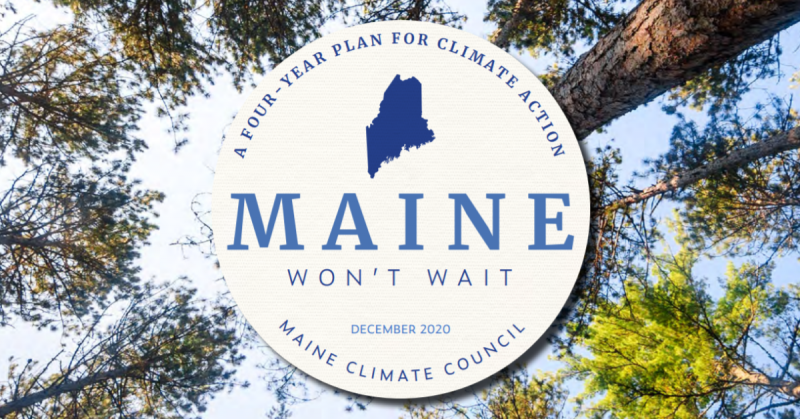To capture benefits of clean energy and forestall climate costs, Maine legislators should take rapid and bold action
The Maine Climate Council’s 15-month process preparing Maine Won’t Wait: A Four-year Plan for Climate Action was a refreshing affirmation of constructive, nonpartisan policymaking. Roughly 230 working group volunteers and many more citizens weighed in to craft strategies grounded in a thorough scientific assessment.
The resulting plan clearly demonstrates that climate is, in the words of Council member Daniel Kleban, owner of Maine Beer Company, “not just an environmental problem” but a clear and present danger that imperils our economic health, our way of life and our children’s future.
Legislators now have an unprecedented opportunity to set Maine on a more sustainable course – safeguarding us from climate threats and simultaneously reinventing our economy to build resilience. With visionary and collaborative climate action in the Legislature, Maine has much to gain. Without it, the state will suffer irretrievable losses.
Helping the hardest-hit
Climate impacts could land hardest on lower-income, rural communities that have few resources to prepare and would – the plan concluded – be “least able to recover from disruption.” The COVID-19 pandemic brought these underlying vulnerabilities into stark relief, revealing “who fell through the cracks and why” in a “system that doesn’t protect us when crisis comes,” said Sen. Chloe Maxmin (D-Nobleboro).
Maine’s climate plan seeks to address long-standing inequities through measures that reinforce the resilience of rural regions and traditional industries. The Legislature will likely consider bond funding to rapidly expand workforce training and living-wage jobs in clean energy, and to fund infrastructure improvements from broadband expansion to flood prevention measures.
Given burgeoning economic opportunities in clean energy and the rising societal cost of doing nothing, the plan’s proposed investments offer a road to recovery for those hardest hit by the pandemic.
Changes that pay for themselves
Unlike states with fracking, oil exploration or coal-mining, Maine has little to lose in forfeiting fossil fuels – beyond the $4.4 billion it shells out each year in oil and gas payments. Maine’s dependence on home heating oil – greater than any other state – drives up household expenses.
Relying on electricity from local and renewable sources could cut average household expenditures for both heating and transportation, which costs the average Maine household about $13,500 each year.
There will be bumps on the road to all-renewable power, but ultimately residents should experience lower and more predictable energy costs, along with cleaner air and greater resilience in the face of market disruptions and natural disasters.
With a marked shift underway in federal climate policy, Maine’s energy transition could quickly gain momentum. It’s hard to imagine the state having 41,000 electric vehicles on the road by 2025, as the plan intends, but the auto industry is pivoting quickly, recognizing that the incoming Biden administration will support its conversion.
Technological advances in batteries are driving down electric vehicle costs, with base models of compact cars like the Chevy Bolt and Nissan Leaf selling – with incentives – for under $25,000 or leasing for less than $200 per month. Consumer Reports found that the lower operating and maintenance costs of electric cars can provide lifetime savings of $6,000 to $10,000 compared to comparable gas-powered models.
The best path forward for traditional industries
For a state reliant on forestry, farming, fishing and tourism, the transition to clean energy holds particular promise. Maine has opportunities to capitalize on new innovations, like wood-based insulation, and take advantage of developing carbon markets.
Maine’s status as the nation’s most rural state might strike some people as grounds for a free pass, leaving climate action to settings that generate more carbon pollution. But the state needs to act precisely because its economy is so grounded in natural systems. The rising fossil fuel emissions that disrupt climate will cause disproportionate harm to our farming, fishing and forestry communities.
A renewed commitment to reduce emissions offers new growth opportunities in natural resource sectors, said Amanda Beal, commissioner of the Maine Department of Agriculture, Conservation and Forestry, given the potential of forests, farms and coastal estuaries to absorb and store carbon, making them a “part of the solution.” The state intends to help farmers and foresters adopt practices to better store carbon and increase their land’s capacity to withstand climate disruptions.
The plan also advocates a marked increase in local food production, which could help the growing ranks of Maine residents struggling to put food on the table.
The pandemic’s hit to tourism businesses will likely be temporary, but climate impacts could inflict enduring blows. If Maine is slow to address sea-level rise and inland flooding, tourism could suffer – incurring costs estimated at nearly $20 billion. Imagine the state losing nearly half of its dry beach area; that prospect – according to the latest projections for sea-level rise – could occur by mid-century.
Infrastructure investments, while costly, will yield significant long-term economic savings. Every dollar spent in pre-disaster risk reduction, the National Institute of Building Sciences calculates, saves $6 in avoided disaster damage.
‘A huge responsibility’
Because Maine’s climate planning process was so participatory, many residents are deeply vested in seeing constructive legislative action. The process has helped rebuild voters’ faith in transparent and inclusive state government.
“State legislatures have such a huge responsibility to get along,” said Maxmin, noting that policy discussions work best when “we focus on our values and have (them) inform our discussions.” It helps, she added, “if everyone is trying to hold on to values of kindness and respect.” When voters witness that break down in the State House, she noted, it “reinforces what they hate about politics.”
Maine’s climate action plan presents policymakers with hard realities and hopeful opportunities. What we need now is a united and concerted effort to carry its strategies forward.























